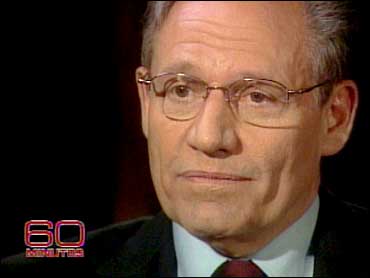Sunday, October 08, 2006
Woodward spills the Beans on Iraq
 The hero of Watergate has been a little quiet of late but his latest book, Plan of Attack, has ended all that. In it- based on scores of interviews with top people including Bush- he lifts the lid on what actually happened over the decision to attack Iraq. This morning on Andrew Marr's programme he shared some of the choicest morsels with British viewers. It seems that as early as five days after 9-11, Bush was 'determined to do something about Saddam Hussein.' Egged on by Rumsfeld and Cheney- who according to Powell had a 'fever' on the subject- he ordered General Tommy Franks to prepare a plan of attack. Powell was opposed throughout according to the account on the CBS site, but, once the CIA told Bush they could not overthrow Saddam, was ordered by his president to put on his 'war uniform'. About this time in early 2003 the Saudi foreign minister was informed of the plan- Woodward confirmed to Marr that Blair was also informed at this time- yet more evidence of Blair's duplicity many of us had assumed at the time. He also said that, as a result of this disagreement, Powell did not speak to his eventual successor, Condi Rice, for some time.
The hero of Watergate has been a little quiet of late but his latest book, Plan of Attack, has ended all that. In it- based on scores of interviews with top people including Bush- he lifts the lid on what actually happened over the decision to attack Iraq. This morning on Andrew Marr's programme he shared some of the choicest morsels with British viewers. It seems that as early as five days after 9-11, Bush was 'determined to do something about Saddam Hussein.' Egged on by Rumsfeld and Cheney- who according to Powell had a 'fever' on the subject- he ordered General Tommy Franks to prepare a plan of attack. Powell was opposed throughout according to the account on the CBS site, but, once the CIA told Bush they could not overthrow Saddam, was ordered by his president to put on his 'war uniform'. About this time in early 2003 the Saudi foreign minister was informed of the plan- Woodward confirmed to Marr that Blair was also informed at this time- yet more evidence of Blair's duplicity many of us had assumed at the time. He also said that, as a result of this disagreement, Powell did not speak to his eventual successor, Condi Rice, for some time. But, despite all warnings, the die was cast: the bombs dropped, the tanks rolled and things have got so bad now, according to Woodward, that an attack is made in Iraq by insurgents once every 15 minutes. More and more it resembles the shambles in Vietnam and it cannot be long before scuttling strategies are investigated. We perhaps read of onesuch in the Sunday Times today. A Congressional study group, set up with presidential approval and led by former Secretary of State James Baker, may very well recommend that Iraq be divided up into three autonomous units recognising the de facto power bases already fighting what is effectively a civil war: the Kurds, the Shias and the Sunnis. This seems like a possible sword to cut the Gordian Knot of Iraq, especially as 'ethnic cleansing' is already well advanced in Bagdhad, but the danger is that it might make things even worse. Consider:
i) wouldn't a Kurdish state lead to demands for inclusion of 'nationals' from Turkey and Iran, triggering a potentially catastrophic regional conflict?
ii) wouldn't the Sunnis refuse to be locked out of the oil which mostly lies in Shia areas?
iii) how would the 'mixed' urban settlements of Iraq's major cities be resolved?
iv)is there not a danger of groups-for example redidual Ba-athists- fighting for the maintenance of a unified state?
Indeed, so disastrously mismanaged has the intervention been that it may well be too late for western action to have any significant effect whatsoever. As Anthony Cordesman of the Centre of Strategic and International Studies, is quoted as saying: 'The internal politics of Iraq have taken on a momentum of their own.' Meanwhile I read in the Sunday Telegraph that an ICM poll reveals over half of British people want withdrawals from Iraq within a year and Afghanistan by the end of this year.



